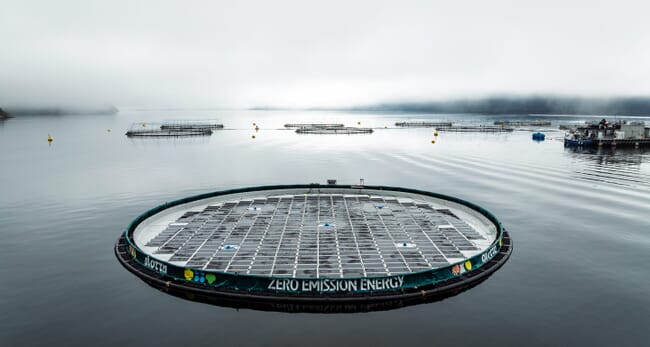
© Alotta
Emilsen Fisk is expanding its use of renewable energy after seeing strong results from a recently installed floating solar power system. Just weeks after activating what is believed to be the world’s northernmost floating solar plant, the aquaculture company has placed an order for a second installation from Ålesund-based green tech provider Alotta.
The system, an Alotta Circle Mc120, has already enabled the fish farming company to cover over 90 percent of its power needs using only solar energy and battery storage.
“We were curious to see how solar power would perform in real conditions – and we got the answer quickly. The diesel generator has barely been running,” says Roy Emilsen, managing director of Emilsen Fisk, in a press release. “It’s quiet at the site – in the best possible way. We’re saving money, reducing emissions, and improving the working environment. That’s why we’re now ordering system number two.”
Alternative energy for aquaculture
Alotta develops and delivers green energy systems, with a strong focus on floating solar power. Designed for maritime conditions, the company’s robust systems combine solar panels and batteries to supply reliable power directly to feed barges – without the need for grid connection or constant diesel use.
“This is a clear sign of the shift happening in aquaculture. A new energy reality is emerging – in places where diesel used to rule, we now see quiet, renewable energy coming from solar and battery systems. When a customer like Emilsen Fisk orders a second installation after just a few weeks of operation, it’s not only about technology. It’s about trust, ambition, and a shared commitment to moving aquaculture into the future. Real change happens when technology and ambition align,” says Kari-Elin Hildre, chief executive officer of Alotta.
Both Emilsen Fisk’s installations are partially funded through support from Enova, a Norwegian government agency that promotes the transition to sustainable energy. According to Alotta, this kind of support is a key driver of change in the industry.
“These incentive programs help more and more fish farmers take the leap – both those without shore power and those already using battery hybrids but wanting to go even greener with solar,’’ says Egil Hjelmeland, chief sales officer at Alotta.
Silent power
Alotta’s chief technology officer, Erik Røynved, is not surprised by the performance results:
“We see this time and time again: with the right system design, solar and battery can cover most of the power needs – and the diesel generator can remain idle. This leads to lower operating costs, less maintenance and a better everyday experience for staff.”
According to Alotta, results from Emilsen Fisk reflect a growing trend in aquaculture: with the right system design, solar and battery power can cover most energy needs, leaving diesel generators largely idle. The result is lower operating costs, reduced maintenance, and a quieter, cleaner working environment.
The company sees this as part of a broader shift in the industry toward more sustainable operations.


